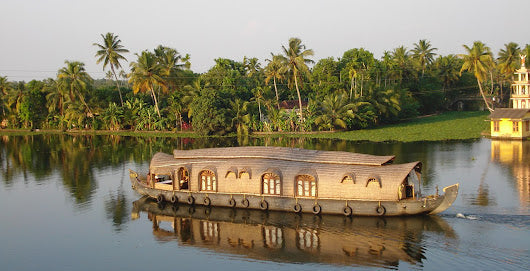
Kerala’s Legacy and Tourism
Share
Nestled in the southwestern corner of India, Kerala is a state that has enchanted travelers for centuries with its breathtaking landscapes, rich cultural heritage, and deep-rooted traditions. Fondly known as "God’s Own Country," Kerala is much more than its serene backwaters and scenic beaches—it is a land where history, nature, and sustainability intertwine, offering a unique and enriching experience to all who visit.
Historical Significance of Kerala
Kerala’s history is as vibrant and diverse as its landscape. The region has been a major center of global trade for over 2,000 years, attracting merchants from faraway lands such as Greece, Rome, China, and Arabia. It was Kerala’s coveted spices—particularly black pepper, cardamom, and cinnamon—that made it a prominent player in the ancient spice trade, earning it a reputation as a "Land of Spices."
The arrival of the Portuguese in the late 15th century, followed by the Dutch and the British, left an indelible mark on Kerala’s culture and history. The influence of these foreign traders is evident in the architecture, cuisine, and even the customs of the region today. Fort Kochi, for instance, still bears the remnants of European colonial rule, with its cobblestone streets, ancient churches, and colonial-era buildings.
Kerala’s rich maritime history also gave rise to a unique blend of cultures, with Hinduism, Christianity, and Islam coexisting harmoniously for centuries. The state is home to some of the oldest Christian churches in India, including St. Thomas Church in Palayoor, built in the 1st century CE, and Cheraman Juma Mosque, believed to be the oldest mosque in India.
Kerala’s Natural Beauty: A Haven for Eco-Tourism
Kerala’s reputation as a natural paradise is well-deserved. Its diverse geography encompasses tranquil backwaters, lush paddy fields, rolling tea plantations, and pristine beaches. The Western Ghats, a UNESCO World Heritage site, stretch across Kerala and are home to an incredible array of flora and fauna, including many endangered species. Wildlife sanctuaries like Periyar and Wayanad offer visitors the chance to witness elephants, tigers, and exotic bird species in their natural habitat.
Kerala’s backwaters are perhaps its most iconic feature. The vast network of canals, lagoons, and lakes, stretching over 900 kilometers, provides a unique ecosystem that sustains not only the local wildlife but also the livelihoods of many Keralites. Traditional houseboat tours offer a peaceful way to explore this watery wonderland, where life seems to move at a slower, more peaceful pace.
Cultural Heritage and Festivals
Kerala’s cultural richness is deeply connected to its history, with age-old traditions being passed down through generations. Classical art forms like Kathakali, a dramatic dance performance characterized by elaborate costumes and expressive makeup, tell stories from Indian epics like the Mahabharata and Ramayana. Similarly, the traditional martial art of Kalaripayattu, believed to be one of the oldest fighting systems in existence, reflects Kerala’s historical ties to ancient practices and beliefs.
Festivals in Kerala are grand celebrations of its diverse culture. Onam, the state’s harvest festival, is celebrated with great fervor, featuring intricate floral designs (Pookalam), boat races, and traditional feasts known as Onasadya. Other festivals, like Vishu and Thrissur Pooram, also draw visitors from around the world, offering a glimpse into Kerala’s vibrant cultural landscape.
Sustainability and Kerala’s Eco-Tourism Initiatives
What sets Kerala apart as a tourist destination is its commitment to sustainable tourism. The state has long championed responsible travel practices, ensuring that its natural beauty and cultural heritage are preserved for future generations. Kerala’s emphasis on eco-friendly tourism can be seen in the way local communities are engaged in tourism activities, promoting the conservation of the environment and providing sustainable livelihoods.
grameencraft.shop is a perfect example of Kerala’s dedication to sustainability. As an authorized seller of eco-friendly handicrafts, Grameen Craft showcases products made from natural materials like jute and canvas, supporting both the environment and the artisans who create these beautiful items. Initiatives like this play a crucial role in promoting conscious consumerism and reducing the state’s carbon footprint.
In recent years, Kerala has also gained recognition for its efforts in promoting “Responsible Tourism”, where travelers are encouraged to respect local traditions, support eco-friendly accommodations, and participate in community-driven tourism activities. These initiatives not only protect Kerala’s fragile ecosystems but also empower local communities by providing sustainable livelihoods.
Why Kerala Continues to Inspire Travelers
Kerala’s legacy as a hub of cultural exchange, trade, and eco-conscious living continues to inspire tourists from around the globe. Visitors are drawn not only to its scenic beauty but also to the warmth of its people, the richness of its culture, and its commitment to preserving the environment.
Whether you’re exploring the ancient spice routes, cruising through the tranquil backwaters, or marveling at the architectural splendors of Fort Kochi, Kerala offers an unforgettable journey through history and nature. It is a place where the past seamlessly blends with the present, and where the future of sustainable tourism is being shaped.
As you embark on your journey through Kerala, remember that every step you take is a part of the state’s ongoing story—a story that celebrates tradition, natural beauty, and the ever-important need to protect our planet for generations to come.